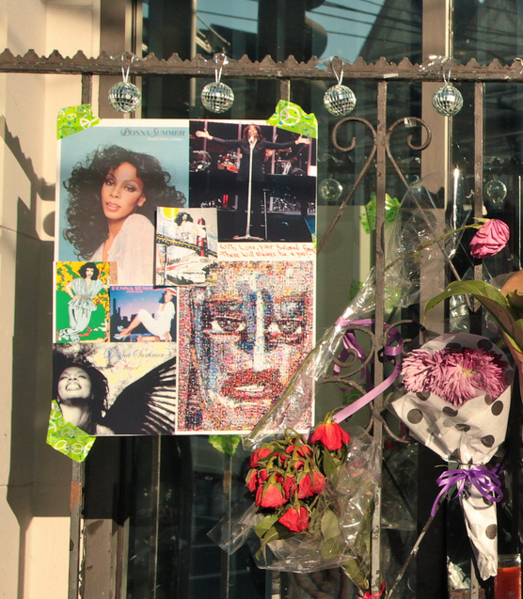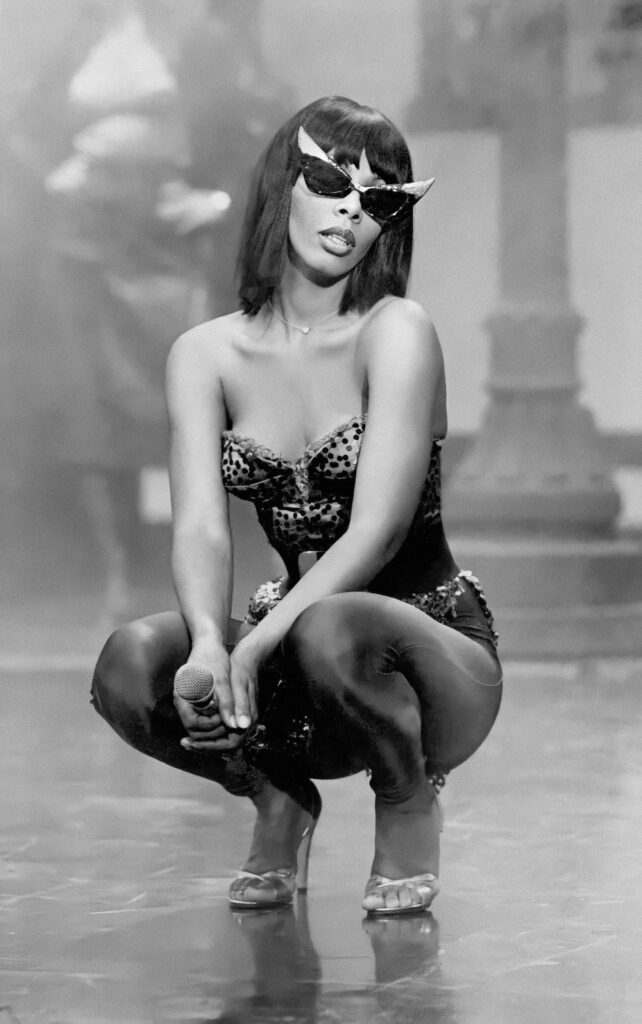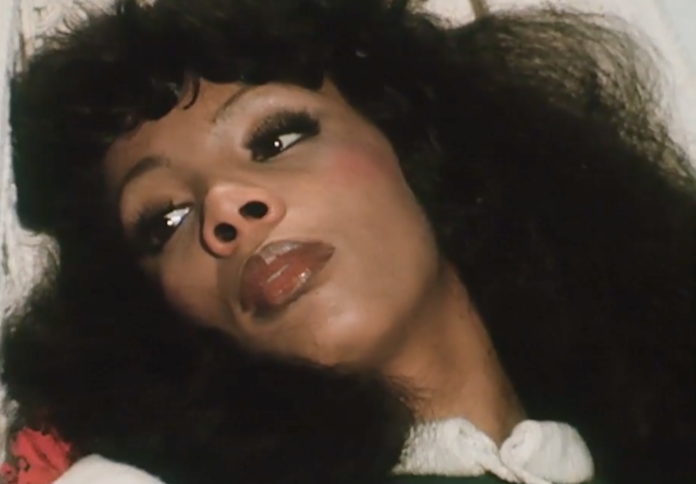[Warning: Light spoilers ahead for the HBO Max documentary Love To Love You, Donna Summer, which premieres on May 20]
HBO Max kindly allowed me to screen Love To Love You, Donna Summer in advance, and while the film leaves some questions unanswered about the late star’s monumental music achievements, her private life, and her viewpoints about the LGBTQ community after becoming a born-again Christian, it’s an earnest and personal exploration that’s essential viewing if you are or were once a fan.
Often pigeonholed as a disco queen, Donna Summer was a truly versatile recording and performing artist who won Grammys in R&B, rock, and inspirational categories. She was an expressive painter who exhibited her work all over the world. And she was a woman who struggled with balancing her career with motherhood.
Summer’s daughter Brooklyn Sudano, an actress who notably appeared on the ABC sitcom “My Wife and Kids,” co-directed the film with Roger Ross Williams as a way to get to know her mother better. She also serves as executive producer with Bruce Sudano, her father and Summer’s husband and musical collaborator. His memories of their creative and romantic partnerships help form the backbone of the story.
“I was always in awe of Mommy’s mind,” he tells Brooklyn, now 42, in a voiceover. “Because of her persona as, you know, sex goddess and ‘First Lady of Lust,’ her artistry as a songwriter got overlooked.”
Brooklyn wanted to understand the controversy that followed Summer in the latter part of her career, after she disappointed loyal fans and concertgoers with onstage banter that included a homophobic trope of God creating “Adam and Eve, not Adam and Steve.”
“A lot of gay people already feel like the church hates them and so what happened was there was another mindset [of], ‘Oh, she became one of those people who hate us,” says her sister Mary Ellen Bernard. “Their perception of what they thought she meant, it was like, ‘You shouldn’t exist.’”

“At some point, I think we made a wrong decision and that decision was not to respond,” Bruce Sudano explains. “We kinda figured, ‘Oh, it’ll go away.’ But it didn’t go away and we had to pay that price. And it was a big price to pay.”
Help us save local journalism!
Every tax-deductible donation helps us grow to cover the issues that mean the most to our community. Become a 48 Hills Hero and support the only daily progressive news source in the Bay Area.
Brooklyn asks her father what it was that people erroneously thought about what Summer said regarding the LGBTQ community.
“At some point it went from this [Adam and Steve] comment into Mommy supposedly saying that AIDS was God’s punishment on gays, and that was just never the case.
“These were people that she loved,” he adds, “and for her to be viewed as somebody that would cause them more pain, it’s something I don’t think she ever got over.”
In the summer of 1999, I was given a 15-minute slot to interview Summer by phone for a now long-defunct music discovery outlet called CDNow. Earlier that year, she released Sing Me Sleep Mommy, a collection of modern Christian lullabies, and starred in “VH1 Presents: Donna Summer Live and More Encore,” footage from which closes out the HBO Max documentary. But I wanted to talk about her foundational electronic music.
In this time before Googling was around to be a daily habit, I barely knew about Summer’s controversy in the LGBTQ community, and I want to believe that her heart wasn’t as challenged as an “Adam and Steve” comment might suggest. Our chat doesn’t touch on that topic, but there are insights on electronic music, sampling, and the surprising extracurricular interests that she would have loved to have had time to tackle.
Music isn’t the chief concern of Love To Love You, Donna Summer, and that has disappointed some critics, but it sure was mine in our short but wonderful interview. I am heartened to be able to share it again, even as some conflicting emotions are stirred by the documentary. The first truly stratospheric star I ever interviewed, Summer taught me early on that some of the biggest artists can be the most graceful and professional.
TAMARA PALMER What inspires you creatively?
DONNA SUMMER Everyone, everything. Everything I see. People that get around me very often for any length of time realize that I’m an extremely visual/audio person. I notice everything, just everything—people’s eyes, people’s clothes, people’s hair, people’s personalities. I’m sensitive to everything around me so I’m constantly commenting on things. That’s how I live my life. I recognize people and their talents and their gifts and try to somehow incorporate that into what I do.
TAMARA PALMER So it’s life itself.
DONNA SUMMER Life! People and experiences. Sometimes I’ll see someone on the street and they’ll be dressed a certain way or going to a certain place or be a certain type of person, and I’ll just make up a whole story based on what appears to me to be. It may not be the truth, but it’s just in my mind. I’ll say, “Oh, that person is probably getting a divorce, or it’s their first love.”

TAMARA PALMER You’ve worn so many professional hats in your career, from writing and singing to painting and acting. Is there a profession that in an ideal world you might like to slip on for a day?
DONNA SUMMER I’d like to be an architect, and a landscape architect. Architecture and inventing, those would be areas …
TAMARA PALMER But you’re already quite an inventor of sorts.
DONNA SUMMER Well, but in the sciences, like inventing things. Doing scientific experiments and creating ways to use things that exist that haven’t been done. I do a lot of my own playing around with that at different times when I’m bored, although no one in the room knows what the heck I’m talking about! It’s kinda tough; my husband’s like, “I think I got ya. You’re too up there. You need to come down to Earth. I don’t get it!” I’m like, “All right, all right—forget it.”
TAMARA PALMER What did you initially think of Giorgio Moroder’s style when you started working with him? It was so unlike anything else at the time.
DONNA SUMMER I didn’t know anything else. I started first with Giorgio, and Giorgio and I inspired each other. The idea of “Love to Love You Baby,” which is the precursor to “I Feel Love,” really was something that I went to Giorgio and said, “Let’s do this.” And Giorgio came up with [simulates Moroder’s rhythm track]. I think the fact that Pete Bellotte and Giorgio did not apply any major lyric to that song left it feeling very pop-syntho [sic]. And if we had made it very heavy with words it wouldn’t have felt the same. Because we did that at first and we just looked at each other and said, “Nah, it’s not gonna work. We’ve got to keep this thing as pure and simple as the music is.”
The collaboration of the three of us—Pete was coming from an English point of view, I was the American point of view, and Giorgio was the European point of view. The marriage of the three of those things kind of spawned that. I think it was the marriage of the situation—the sound of my voice, the way I sung it. I sang it emotionally, where a lot of times [when] you hear pop-syntho stuff it’s very [simulates repetitive, noisy machine sounds]. There’s no emotion in it. But I didn’t do that. If you listen to the track, I really sang it with feeling. That’s why I think it was very special.
TAMARA PALMER You’ve been sampled and interpolated many times, most recently by TLC on their Fan Mail album. They sang the “Love To Love You Baby” chorus in a lascivious track called “I’m Good At Being Bad.” I understand you weren’t too pleased by the messages in that song. How do you feel about sampling in general, and how did that situation in particular feel?
[Note: This was four years before Beyonce interpolated the song for “Naughty Girl” in 2003. ]
DONNA SUMMER I don’t mind sampling as long as there is an agreement: You can’t use my voice in something that I don’t agree on. I don’t want to be a part of that; that’s not what my message is in life. To become part of something that is not what you want is not right. It’s really an infringement on your copyright. If somebody comes to you and asks you, can they use your copyright, and they present to you one picture and when you hear it, it’s another? That’s where you have problems.
TAMARA PALMER Has that happened?
DONNA SUMMER Oh yeah, that’s what happened. A lot of times, people will pitch to you what they want you to hear and you give them your approval, and then they change it. And then it’s like, I didn’t approve that. But they’ve got your name on a piece of paper and you have to prove that you didn’t hear it that way. It’s really a touchy situation—I think it’s kind of fun to have people sample things, but like I said, it just has to be used in the context of what I feel like I can live with.
Tamara Palmer’s favorite Donna Summer song is “Love Is in Control (Finger on the Trigger).” Love to Love You, Donna Summer premieres on HBO Max on May 20. More info here.




